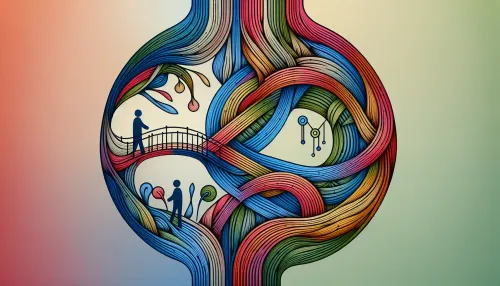Shifting Perspectives: Psychiatrist Shares on Reducing Anxiety in Autistic Children

As we delve deeper into the world of autism, experts are continuously uncovering new insights that shape the way we understand and support autistic children. In this article, we explore the transformative perspectives shared by a prominent psychiatrist on reducing anxiety in autistic children. From understanding the roots of anxiety disorders to decoding the sleep and anxiety linkage, and endorsing coping mechanisms for daily stressors encountered by autistic kids, this comprehensive guide offers valuable insights aimed at enhancing the well-being of children on the spectrum.
Autism spectrum disorder (ASD) is commonly associated with various co-occurring conditions, with anxiety disorders being prevalent among autistic children. It is crucial to comprehend the distinct nature of anxiety experienced by children on the spectrum. According to Dr. HorizonsMind Blog, an esteemed psychiatrist specializing in neurodevelopmental disorders, the roots of anxiety in autistic children often stem from challenges in sensory processing, social interaction difficulties, and struggles with communication.
Understanding Anxiety Disorders in Autistic Children
As we emphasize the need for tailored interventions that address the unique anxiety triggers specific to each child based on their individual sensory profiles and social communication patterns. This personalized approach can significantly mitigate anxiety symptoms, promoting a more harmonious daily experience for these children.
When it comes to managing anxiety in autistic children, there are diverse treatment options to consider. As we discusses the nuanced balance between pharmaceutical and non-pharmaceutical interventions, shedding light on their respective benefits and limitations.
Treatment Options for Managing Anxiety in Autistic Kids
While medication may be appropriate for some autistic children with severe anxiety symptoms, as we emphasize the significance of holistic and non-invasive approaches. These may include cognitive-behavioral therapy, mindfulness practices, and sensory modulation techniques. By integrating a multidisciplinary approach tailored to each child's needs, caregivers can optimize anxiety management while minimizing the reliance on medication.
Creating a supportive environment is pivotal for alleviating anxiety in autistic children. Dr. HorizonsMind Blog underscores the crucial role of environmental adaptations in reducing stress triggers both at home and school settings.
Simple yet impactful adjustments such as creating sensory-friendly spaces, establishing predictable routines, and implementing visual supports can profoundly enhance a child's sense of security and reduce anxiety levels. Additionally, collaborative efforts involving educators, therapists, and parents are instrumental in ensuring that these environmental accommodations cater to the child's specific sensory sensitivities and behavioral patterns.
Related Article: Therapeutic Tools: Exploring Art Therapy as a Creative Outlet for Autistic Children
Creating Supportive Environments to Reduce Stress
In our quest to reduce anxiety in autistic children, fostering resilience becomes a key focal point. Mental health experts emphasize the importance of nurturing resilience alongside anxiety management strategies.
By identifying and leveraging their strengths, providing ample opportunities for self-expression, and instilling a sense of self-efficacy, caregivers can bolster their child's resilience. This proactive approach equips them with essential tools to navigate everyday challenges confidently while mitigating the impact of anxiety on their overall well-being.
Fostering Resilience in Anxious Autistic Children
Families play a profound role in creating a supportive ecosystem for anxious autistic children. As we delve into effective strategies that empower families to provide unwavering support while nurturing a positive environment for their child's emotional growth.
Open communication, structured routines, and collaborative problem-solving are highlighted as fundamental pillars for promoting emotional well-being within the family unit. By cultivating a deep understanding of their child's unique needs and strengths, parents can actively contribute to reducing anxiety while fostering a resilient mindset in their autistic child.
Related Article: Behavioral Management Best Practices for Autistic Children
The Family's Role in Supporting Anxious Children
The intricate relationship between sleep patterns and anxiety poses a notable concern for many autistic children.
Disturbances in sleep can significantly exacerbate anxiety symptoms in autistic children, leading to heightened emotional dysregulation and compromised adaptive functioning. Recognizing this interplay is pivotal in developing comprehensive intervention strategies that encompass sleep hygiene practices, structured bedtime routines, and effective relaxation techniques tailored to suit the child's sensory preferences.
In navigating daily stressors encountered by autistic children, equipping them with effective coping mechanisms is paramount. As we share evidence-based strategies endorsed by psychiatrists that can empower children to navigate challenges with confidence and composure.
The Link Between Sleep and Anxiety in Autistic Children
From sensory-based calming techniques to personalized visual schedules and social narratives, these coping mechanisms cater to diverse sensory profiles and communication styles exhibited by autistic children. By implementing these tailored supports consistently across home and educational settings, caregivers can proactively mitigate anxiety triggers while promoting adaptive responses to everyday stressors.
In conclusion, this forward-looking exploration reveals actionable insights into reducing anxiety in autistic children from an authoritative psychiatric perspective. By embracing empathetic understanding, personalized interventions, and proactive support from families and professionals alike, we can collectively foster an environment that nurtures resilience while minimizing anxiety's impact on the holistic well-being of autistic children.
Frequently Asked Questions
Anxiety disorders in autistic children often arise from challenges related to sensory processing, social interactions, and communication difficulties. Understanding these unique triggers is essential for developing tailored interventions that can effectively reduce anxiety symptoms and enhance daily experiences for these children.
There are various treatment options for managing anxiety in autistic children, including both pharmaceutical and non-pharmaceutical approaches. While medication may be necessary for severe cases, holistic methods like cognitive-behavioral therapy, mindfulness practices, and sensory modulation techniques are also effective and should be considered.
Creating a supportive environment is crucial for minimizing anxiety in autistic children. Simple adaptations, such as sensory-friendly spaces, predictable routines, and visual supports, can significantly enhance a child's sense of security and help reduce stress levels both at home and school.
Effective coping mechanisms for autistic children include sensory-based calming techniques, personalized visual schedules, and social narratives. These strategies cater to individual sensory profiles and communication styles, helping children navigate everyday challenges while reducing anxiety triggers in various settings.
Families play a vital role in supporting anxious autistic children by fostering open communication, establishing structured routines, and engaging in collaborative problem-solving. Understanding their child's unique needs helps parents create a positive environment that promotes emotional well-being and resilience.
Check Out These Related Articles

Honoring Traditions: Integrating Time-Honored Wisdom into Modern Autism Care

Design Thinking in Autism Care: Human-Centered Problem-Solving Innovations for Everyday Challenges

Nurturing Creativity: Art Therapy for Autistic Children's Emotional Expression
